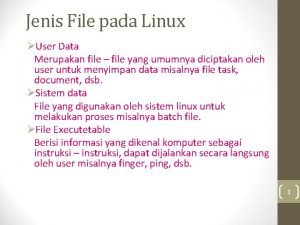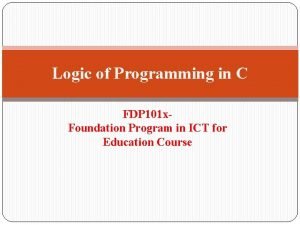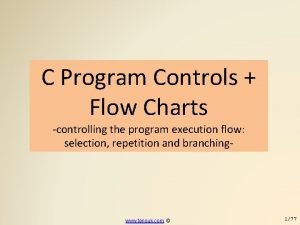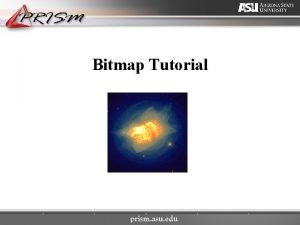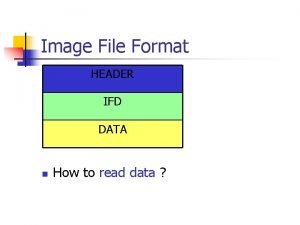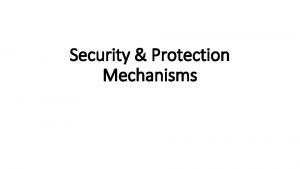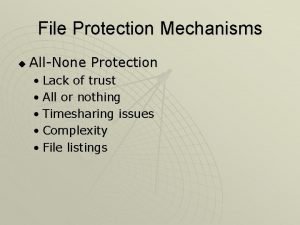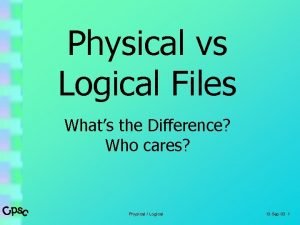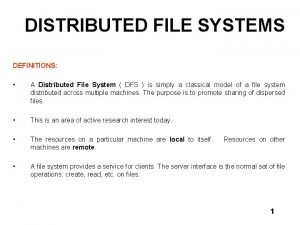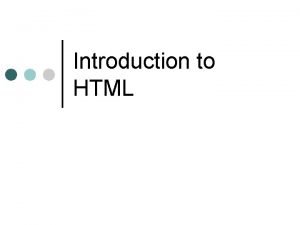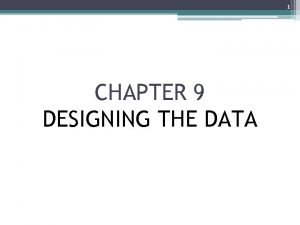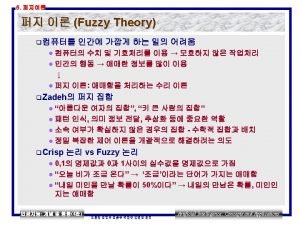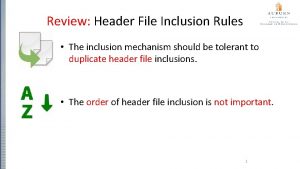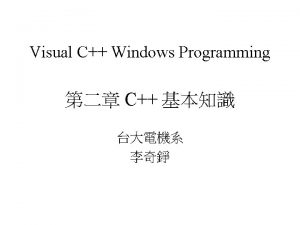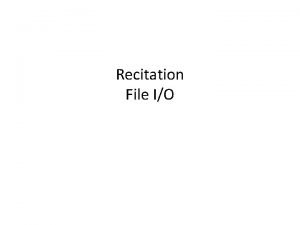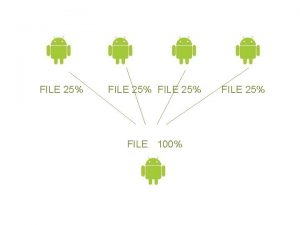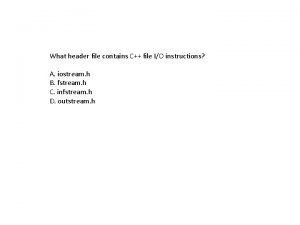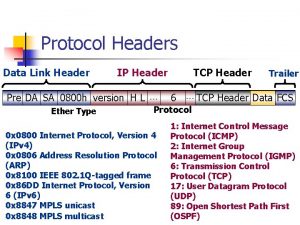Review Header File Inclusion Rules The inclusion mechanism

















- Slides: 17

Review: Header File Inclusion Rules • The inclusion mechanism should be tolerant to duplicate header file inclusions. • A header file should be included only when a forward declaration would not do the job. • The order of header file inclusion is not important. 1 -1

COMP 2710 Software Construction Makefiles Dr. Xiao Qin Auburn University http: //www. eng. auburn. edu/~xqin@auburn. edu These slides are adapted from notes by Dr. George Bebis (UNR)

Makefiles Ø Provide a way for separate compilation. Ø Describe the dependencies among the project files. Ø The make utility.

Example • Demo: dtime. h, dtime. cpp timedemo. cpp g++ -c dtime. cpp g++ -c timedemo. cpp g++ dtime. o timedemo. o –o timedemo

Using makefiles Naming: Ø makefile or Makefile are standard Ø other name can be also used Running make –f filename – if the name of your file is not “makefile” or “Makefile” make target_name – if you want to make a target that is not the first one

makefiles content Makefiles content Ø rules : implicit, explicit Ø variables (macros) Ø directives (conditionals) Ø # sign – comments everything till the end of the line Ø sign - to separate one command line on two rows

Sample makefile Ø Makefiles main element is called a rule: target : dependencies TAB commands Example: my_prog : eval. o main. o g++ -o my_prog eval. o main. o eval. o : eval. c eval. h g++ -c eval. c main. o : main. c eval. h g++ -c main. c _____________ # -o to specify executable file name # -c to compile only (no linking) #shell commands

Exercise 2: makefile Ø Follow this sample: my_prog : eval. o main. o g++ -o my_prog eval. o main. o eval. o : g++ -c main. o : g++ -c eval. h eval. c main. c eval. h main. c Write a makefile for the following project: g++ -c dtime. cpp g++ -c timedemo. cpp g++ dtime. o timedemo. o –o timedemo

Variables The old way (no variables) A new way (using variables) C = g++ OBJS = eval. o main. o HDRS = eval. h my_prog : eval. o main. o g++ -o my_prog eval. o main. o eval. o : eval. c eval. h g++ -c –g eval. c main. o : main. c eval. h g++ -c –g main. c my_prog : eval. o main. o $(C) -o my_prog $(OBJS) eval. o : eval. c $(C) –c –g eval. c main. o : main. c $(C) –c –g main. c $(OBJS) : $(HDRS) Defining variables on the command line: Take precedence over variables defined in the makefile. make C=cc

Implicit rules Ø Implicit rules are standard ways for making one type of file from another type. Ø There are numerous rules for making an. o file – from a. c file, a. p file, etc. make applies the first rule it meets. Ø If you have not defined a rule for a given object file, make will apply an implicit rule for it. Example: Our makefile my_prog : eval. o main. o $(C) -o my_prog $(OBJS) : $(HEADERS) The way make understands it my_prog : eval. o main. o $(C) -o my_prog $(OBJS) : $(HEADERS) eval. o : eval. c $(C) -c eval. c main. o : main. c $(C) -c main. c

Defining implicit rules %. o : %. c $(C) -c –g $< C = g++ OBJS = eval. o main. o HDRS = eval. h my_prog : eval. o main. o $(C) -o my_prog $(OBJS) : $(HDRS) Avoiding implicit rules - empty commands target: ; #Implicit rules will not apply for this target.

Automatic variables are used to refer to specific part of rule components. target : dependencies TAB commands #shell commands eval. o : eval. c eval. h g++ -c eval. c $@ $< $^ $? - The name of the target of the rule (eval. o). - The name of the first dependency (eval. c). - The names of all the dependencies (eval. c eval. h). - The names of all dependencies that are newer than the target

make options: -f filename - when the makefile name is not standard -t - (touch) mark the targets as up to date -q - (question) are the targets up to date, exits with 0 if true -n - print the commands to execute but do not execute them / -t, -q, and -n, cannot be used together / -s - silent mode -k - keep going – compile all the prerequisites even if not able to link them !!

Phony targets: Targets that have no dependencies. Used only as names for commands that you want to execute. clean : rm $(OBJS) _________ To invoke it: make clean or . PHONY : clean: rm $(OBJS) Typical phony targets: all – make all the top level targets. PHONY : all: my_prog 1 my_prog 2 – delete all files that are normally created by make print – print listing of the source files that have changed clean

VPATH Ø VPATH variable – defines directories to be searched if a file is not found in the current directory. VPATH = dir : dir … / VPATH = src: . . /headers / Ø vpath directive (lower case!) – more selective directory search: vpath pattern directory / vpath %. h headers / Ø GPATH: GPATH – if you want targets to be stored in the same directory as their dependencies.

Variable modifiers C = g++ OBJS = eval. o main. o SRCS = $(OBJS, . o=. c) my_prog : $(OBJS) $(C) -g -c $^ %. o : %. c $(C) -g -c S< $(SRCS) : eval. h #!!!

Conditionals (directives) Possible conditionals are: if ifeq ifneq ifdef ifndef All of them should be closed with endif. Complex conditionals may use elif and else. Example: libs_for_gcc = -lgnu normal_libs = ifeq ($(CC), gcc) libs=$(libs_for_gcc) else libs=$(normal_libs) endif #no tabs at the beginning
 Icmp protokoll
Icmp protokoll File-file yang dibuat oleh user pada jenis file di linux
File-file yang dibuat oleh user pada jenis file di linux Libray function getch() belongs to which header file?
Libray function getch() belongs to which header file? Cstdlib header file in c++
Cstdlib header file in c++ Bmp file header
Bmp file header Implobe
Implobe Ifd data
Ifd data File protection mechanisms
File protection mechanisms Different file protection mechanism
Different file protection mechanism Physical image vs logical image
Physical image vs logical image Fungsi sistem file
Fungsi sistem file Remote file access in distributed file system
Remote file access in distributed file system Markup tag tells the web browser
Markup tag tells the web browser In a file-oriented information system, a transaction file
In a file-oriented information system, a transaction file V-file-input rules
V-file-input rules Hình ảnh bộ gõ cơ thể búng tay
Hình ảnh bộ gõ cơ thể búng tay Bổ thể
Bổ thể

